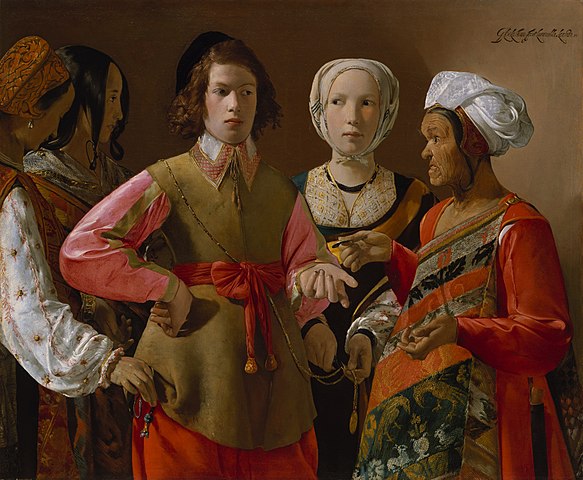The Fortune-Teller, 1635 by Georges De La Tour (1593-1652, France)
I'll start by letting you know I'm not an art critic, nor an art historian, I'm just a guy who has become interested in an awful lot of things through role-playing games.
That said, I think this is a good example of a D&D-like (or maybe Blades in the Dark-like) piece of art that existed before that game did.

Why?
- His outfits were not exemplary of the time period. In other words, he was doing the same shit D&D artists do: wardrobe for the story they wanted to tell. From the second image "As was often the case with La Tour, the costumes are extraordinary creations. They ought not to be taken as ... authentic clothing found in Lorraine around 1630".
- His detail in a given image varies from subject to subject in the work. Some are intensely detailed, some are there, but not really extensively developed. This strikes me as a good metaphor for writing in general, and RPGs more specifically, whether we're talking about rule sets, situation authoring, world building, or running a game.
- This particular work I find quite fascinating, because it's also a potential RPG scenario. The young man is asking "the old gypsy" (as referenced in the second text, I'll call her "the fortune-teller" for the rest of this discussion) to tell him his fortune. While he's doing that, the two women on the left implied to be of the same cultural group as the the fortune-teller are working him over: one is picking his pocket, while the other is eyeing the woman situated between the old woman and the mark.
- The woman of the presumed dominant cultural group is using this opportunity to also work the mark, looking to steal his gold medal. Oh, the humanity! Don't leave your medal dangling!
- "A higher-value coin, which might afterwards be given to the the [fortune-teller] as a reward rather than as payment per se, was alleged to improve the quality of the prophecy". This is even better for running old school D&D games, let them pay extra money to get more clarity on what they're supposed to do! You drain their gold and they get a better idea of what's going on if they take that hook!? Total DMing win!
Do you agree? Do you disagree? Do you have other examples? Blog back at me, or leave a comment!
References
- Georges de la Tour and His World
Conisbee, Philip et al
New Haven, Connecticut: Yale University Press, 1996. Hardcover. Red cloth with color-illustrated dj. 319 pp. Numerous color and bw plates. New Book. Item #20029000001
ISBN: 9780300069488 - Specifically, the one page I read was page 174
- https://en.wikipedia.org/wiki/The_Fortune_Teller_(La_Tour)
Comments
Post a Comment